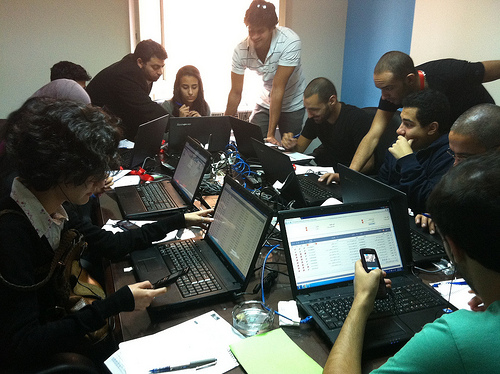Egypt: When Tech is the Least of Your Problems

I'm on the ground in Cairo supporting the first big electoral test of Egypt's revolution. At least that's the plan. As you might have noticed if you've been anywhere close to a media outlet in the last week, things have been a bit chaotic, and it's not a lock that the polls will take place on time. NDI works in a lot of volatile places, particularly around elections. Unpredictable environments like this leave us with a lot of factors that are simply not in our control.
Egypt is shaping up as the gold standard for those cases.
It's not really my role to comment on the politics of the situation in these pages, so I'll simply say the dynamics are fascinating, confusing, and worrisome. The twitters are again proving an excellent resource (#egypt, #egyelections, #nov26, #tahrir and old standby #jan25 are hot) and alumna Katherine Maher is posting interesting on-the-ground updates with Access Now on their blog.
While every election is unique, there are a lot of logistics for this election that will be familiar for those who've kept up with NDItech's past stories. We've got a data center (Zambia) we've trained data clerks (Zambia again), we've worked with local developers (Iraq, another post on Egypt to come) and we ran a simulation (Nigeria) on Thursday.
It's all gone <knockwood>quite well so far.</knockwood> There were some obstacles we discovered through the simulation: namely, that we really pissed off the networking gods at some point. We hit a wall with our DSL connection, so added another. That didn't work well either. Then we added two GSM USB modems. One of those worked, sometimes. The local WiFi connection had tremendous problems, only letting a handful of people on, so we rewired everything with physical cables taped to the floor - classy! All in all, it was par for the course. I will be sure to sacrifice a Cat 6 tomorrow to ensure an auspicious outcome.
Our real challenges aren't technical; unlike, say, the Great Nigerian Techoocolypse. They're not organizational; our partners who have been doing a good job in tough, shifting situations.
The big problems are at an entirely different level. Egypt has a ridiculously complex election system; the code is a bit of a frankenstein's monster stitched together from Russia, Indonesia and perhaps Mars. I'm here with my friend and colleague Michael Baldasarro who has been shepherding NDI's efforts; after an hour talking through how voting will work my eyes glazed over and brain shut off. For one example, among the bizarre socialist throwback unique elements is that 50% of the parliament must be farmers or workers. Such complexity will lead to confusion with will lead to inconsistent interpretation of the code - which makes the work of our observers that much more important.
The parliamentary elections are taking place over three rounds with a runoff after each plus the Shura (kinda an advisory Senate) to cap it all. Why 8 election rounds? The second most respected institution in the country pre-revolution was, after the army, the judiciary, thanks to their occasional stands against the regime. As such, every single polling center is being overseen by a judge responsible for maintaining the integrity of the vote. As there are only so many judges to go around they've split the provinces up into thirds. That's a tremendous logistical headache for the our partners and their observers, who will have to be accredited before each round. To do our magic with a statistically-based sample of polling stations, it is absolutely required that you get a very high percentage of reports in; if you don't get that sample, you don't have anything.
Then, on top of that, there's been the political chaos which has been documented exhaustively via cell-phone video and pics as well as some stunning professional photo galleries. Hundreds of thousands have demonstrated in Tahrir Square and across Egypt over the last week; attempts to shut down the protests sparked violence that threatened to spiral out of control. When observers are afraid for their personal safety when monitoring an election it's hard to argue with them.
With the security challenges and logistical challenges, it seemed possible - even likely - that the elections would be postponed. We spent the weekend gaming out alternative scenarios and how to deal with them. What we got on Saturday was a real curve ball - elections were not going to be delayed. They were going to be doubled. The Powers That Be decided that there should be two days of voting, and now the observers have to go out and do the same thing for two long days in a row. In the data center our clerks and databases had to shift to adjust - with 48 hours to go.
Things particularly got tougher for the information management systems; one would design a system very differently for one election over two days. Our developer is pretty quick on his feet, and with a quick clone of the existing server we'll be able to make it work out by treating it as two different elections in sequence and then processing the results.
It's been a lot of hoops to jump through for elements that are beyond our control, but that's just the nature of the game. While there's anxiety in these unstable situations, I think than now the prevalent emotion in Egypt is excitement. As the first election in over 50 years where the outcome is not a foregone conclusion it's not surprising that there's going to be bumps along the road.
Tomorrow's election day. Fingers crossed that all goes well - it's a huge day for for the biggest country in the Middle East.
